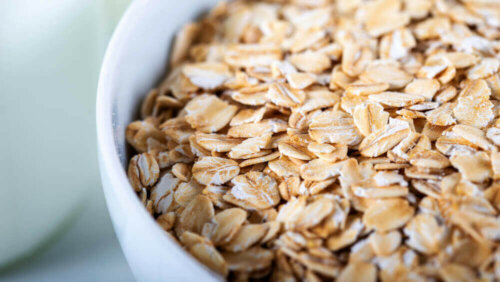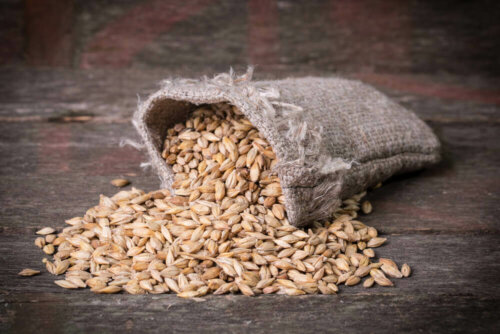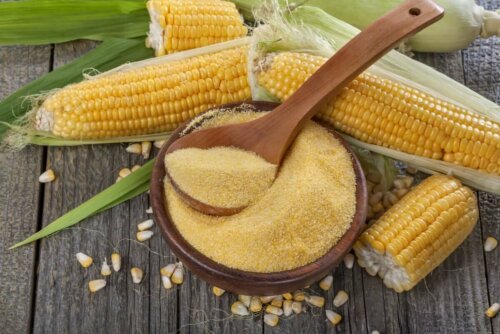Six Healthy Whole Grains You Should Have in Your Diet


Reviewed and approved by the pedagogue in physical education and nutritionist Elisa Morales Lupayante
The consumption of healthy whole grains has shot up in the past few years. This isn’t just because they help add variety to your meals. In reality, they represent an important source of nutrients that benefit the body. There used to be myths about their consumption for many years. However, today we know they’re a fundamental part of our healthy diet plan. This is because they’re a significant source of fiber and complete carbohydrates.
Thanks to these qualities, whole grains are one of the most valuable energy ingredients. In fact, they’re essential for those who are looking to lose weight. The most interesting part is that there are many varieties. Because of their flavor, you can include them in your regular diet along with other ingredients. So that you don’t miss out on taking advantage of their benefits, we’ll share 6 whole grains that you should have in your diet.
Healthy whole grains you should have in your diet
1. Oats

Also known as the “queen of whole grains,” oats are a food with a high energy value. Because of their natural composition, they deserve a main spot in your regular diet.
- Oats are known for their significant contribution of slow absorbing carbohydrates. These help to regulate blood glucose levels, which makes it easier to transform them into energy sources.
- In addition, they contain large amounts of dietetic fiber. This promotes the control of bad cholesterol (LDL), digestion and relieves anxiety caused by food.
- Plus, oats are a significant source of B vitamins. These are necessary for the correct function of the nervous and muscular systems.
- Finally, they also help to improve metabolic rhythm and protects the cells from the effects of free radicals. This is due to the scientifically proven effect of antioxidants.
Read about The Benefits of Having Oatmeal for Breakfast
2. Whole grain rice
White rice is more common in the supermarket. However, it’s essential to know that whole grain rice is the better alternative to enjoy 100% of the nutritional properties of this food.
- First of all, it contains important amounts of B vitamins. These help improve the functions of the nervous system and the brain.
- It’s also a significant source of magnesium. This an essential mineral that participates in hundreds of the body’s biological processes. This nutrient is able to improve sleep quality, according to a study published in Nutrients.
- Plus, it’s natural fiber improves digestion and prolongs satiety
- Finally, it even optimizes the absorption of essential nutrients and is good for your cardiovascular health
3. Healthy whole grains: barley

Barley is the fifth most cultivated grain in the world. Although it isn’t safe for celiacs, it’s a low-calorie food that provides the body with important nutrients.
- First of all, it contains vitamins B1 and B2, as well as zinc, magnesium and dietetic fiber
- Barley also helps to improve digestion and reduces the absorption of harmful lipids in the intestine
- In addition, it’s one of the best natural remedies for hypercholesterolemia and high triglycerides
- Barley regulates the intestinal tract and helps with the elimination of waste
- It’s even recommended as a complement for helping to lose weight since it’s filling and energizing
Get to know the different Types of Celiac Disease and Their Characteristics
4. Whole rye
Rye is one of the healthiest grains that can be added to your regular diet. It contributes a large amount of nutrients, but is low in calories.
- Its significant contribution of fiber promotes the control of high cholesterol, eliminating its accumulation in the arteries
- In addition, it helps improve intestinal movement, preventing conditions like constipation
- It’s also recommended for regulating blood sugar levels and reducing the risk of metabolic diseases
- Rye contains vitamin E and selenium, known for their antioxidant effect in the body
- Finally, it helps to improve mental performance and decreases the risk of nervous and cognitive disorders
5. Corn

Corn is a traditional food that has been used as a source of energy thanks to its contribution of slow-absorbing carbohydrates.
- Corn is valued for its high contribution of vitamins A, B and E. These protect the nervous, immune and cardiovascular system.
- Plus, it also contains dietetic fiber, necessary for the correct function of the intestine
- Its antioxidants help to protect the cells against the effects of oxidative stress
- Corn contributes to protecting the skin’s collagen, decreasing the appearance of the signs of premature aging
6. Buckwheat
Buckwheat is a food that is safe for those with celiacs and a gluten intolerance because it doesn’t contain this protein.
- It’s known for its significant contribution of amino acids of high biological value. These help to keep the body active and the muscles strong.
- Plus, it contains minerals like magnesium and iron that are necessary for having good blood health
- It also has a low glycemic index which helps to keep sugars at a stable level
Eat more of these healthy whole grains
Do you eat these grains? Now that you know how important they are for the body, include them in your regular diet and benefit from their nutrients.
After knowing how important they are for the body, you’ll surely find it easier to give them a chance in your daily life. In this sense, keep in mind you should always consume them in their whole grain variety and without added sugars, since many commercial presentations contain these additives and in the end detract from their nutritional value.
All cited sources were thoroughly reviewed by our team to ensure their quality, reliability, currency, and validity. The bibliography of this article was considered reliable and of academic or scientific accuracy.
- Sharma GN., Gupta G., Sharma P., A comprehensive review of free radicals, antioxidants, and their relationship with human ailments. Crit Rev Eukaryot Gene Expr, 2018. 28 (2): 139-154.
- Cao Y., Zhen S., Taylor AW., Appleton S., et al., Magnesium intake and sleep disorder symptoms: findings from the jiansu nutrition study of chinese adults at five year follow up. Nutrients, 2018.
- Sima P., Vannucci L., Vetvicka V., B glucans and cholesterol. Int J Mol Med, 2018. 41 (4): 1799-1808.
This text is provided for informational purposes only and does not replace consultation with a professional. If in doubt, consult your specialist.








